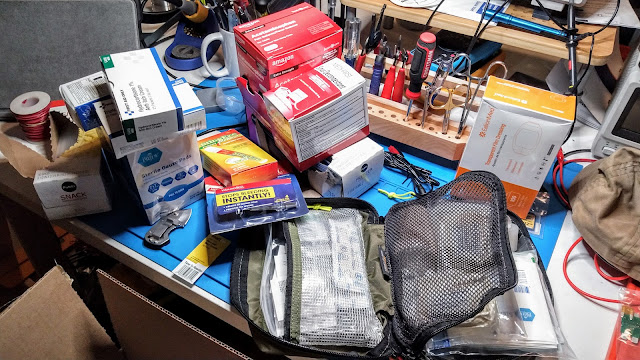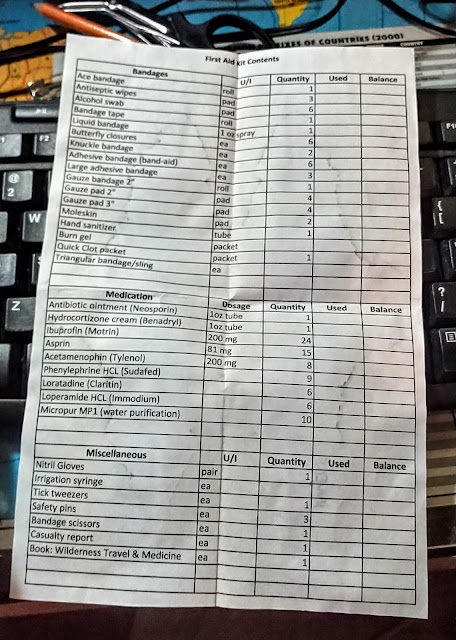Like a lot of Amateur Radio operators, there's a good bit of 'prepper' in me; taking the steps to make sure we've got the supplies and expertise to make it through the most likely disaster scenario is important. After 23 years in the Army, where we prepped for everything from nuclear war to frostbite, being ready for anything gets under your skin becomes a way of life. So a few weeks ago I did a post-COVID check or our first aid kits and was surprised to find that much of what we have on-hand has expired. Now, stuff like gauze and band-aids that are stored in cool, dry conditions actually have a long shelf life, but supplies that are stored under hot, humid or cold conditions for extended periods of time actually have short shelf lives and need to be rotated regularly. I was shocked to discover that much of what we have in our automobile kits was badly out-dated (2018 expiration dates), so I just tossed the kits and ordered new ones.
I like to build my own kits, based on intended use. For example, we carry a large medical kit in our camper I could probably use to treat a mass casualty event, and it also includes medications for our dogs, who we take camping. Likewise, the kit we keep in our house (which is really more like a complete shelf full of stuff in our linen closet) could stock a small emergency room and has supplies specifically for small children (our grandkids).
I also have a small personal kit that I carry when I'm out fishing or doing something like a POTA activation. The contents of that kit were in pretty rough shape, with many of the wet packets, like alcohol prep pads, betadine wipes, and hand wipes having gone completely dry, and the packaging for some of the gauze packets starting to yellow. Ouch, that's bad.
So I did what I often do - I checked on Amazon to see if they carry what I need. Indeed they do! In fact, many of the standard supplies like gauze pads, tape, adhesive bandages, and single pack medications (acetaminophen, ibuprofen, Sudafed, antiseptic cream, etc) are dirt cheap when bought in bulk. This means I can rotate stock frequently and not really worry about the cost.
 |
| Out with the old, in with the new |
A few quick observations.
- A personal kit is just that - enough supplies to get you and a companion through the normal scrapes and bumps of a short outdoor adventure. If you are stocking to be able to treat sucking chest wounds caused by automatic gunfire, well, you are out of the 'personal kit' league
- Keep everything dry. All my personal kit supplies are in ziplock bags, and the entire kit is carried in a waterproof SealLine bag (see below)
- Consider your unique health requirements. For example, if you are allergic to acetaminophen (Tylenol) then don't carry it. Double up on aspirin or ibuprofen
- I've heard from more than one Army medic with actual battlefield injury treatment experience that you can never carry enough 4" x 4" or 3" x 3" sterile gauze pads. They are the swiss army knife of emergency supplies, used for treating everything from puncture wounds to burns
- I hang out with a lot of old folks, and old folks take a lot of blood thinners. This means they can bleed, and bleed a lot, from the simplest cut. I include a lot of 'quick clot' powder in my kit. Trust me, I've had to use it more than I ever thought I would
- I live in the south, where every damned insect either bites or stings. I carry a 'Sting-Eze' applicator, plus hydrocortisone cream packets
- Ticks are a constant problem here in the south, and the quicker you get them off of you the less likely the chance you'll get one of the many diseases they carry. I have a small set of tweezers in my kit for dealing with the little bastards, and splinters, thorns, etc.
- Leave the snakebite kits at home. Better yet, toss them in the trash. Get bit? Get to the hospital ASAP
- Have a supply inventory sheet you can check against to make sure you're not forgetting anything
 |
| Keep everything dry, and if something does get wet, toss it and replace it |
 |
| Keep a supply list with your kit. This one's outdated, but you get the idea |
